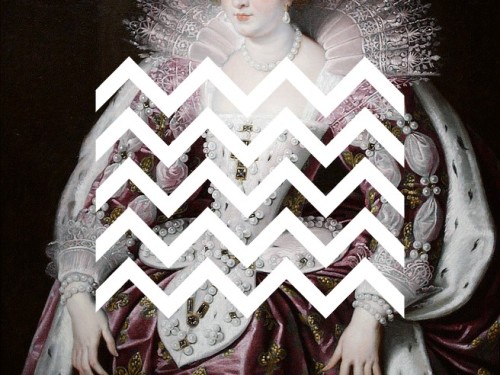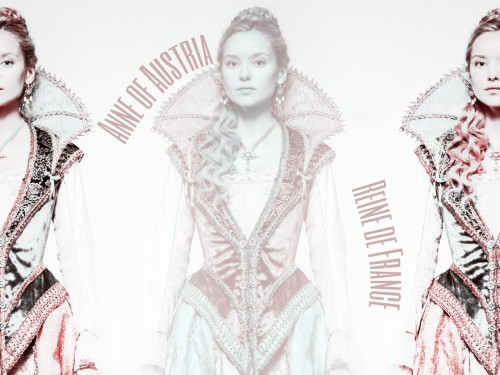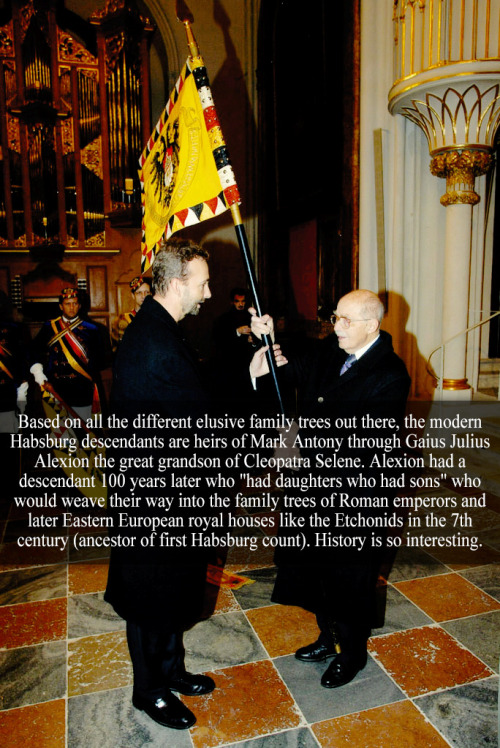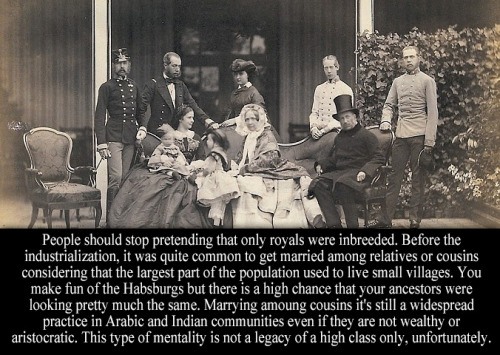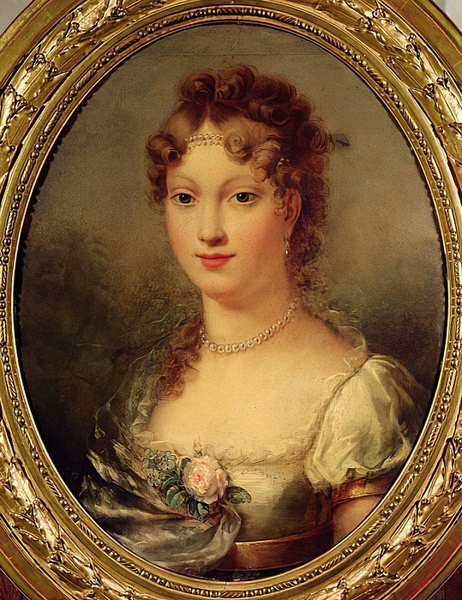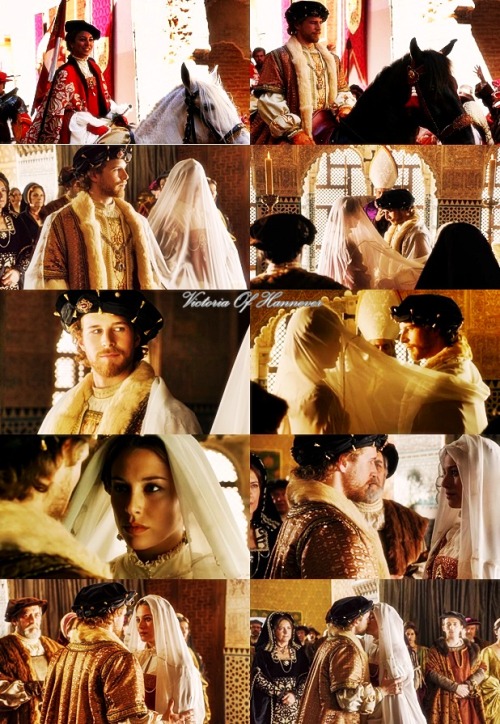#house of habsburg
Anne of Austria was born on 22 September 1601 at Benavente Palace in Valladolid, Spain, and baptised Ana María Mauricia, she was the eldest daughter of King Philip III of Spain and his wife Margaret of Austria. She held the titles of Infanta of Spain and of Portugal and Archduchess of Austria. In spite of her birth in Spain, she was referred to as Anne of Austria because the rulers of Spain belonged to the House of Austria.
Anne was raised mainly at the Royal Alcazar of Madrid. Exceptionally for a royal princess, Anne grew up close to her parents, who were very religious. She was raised to be religious too, and was often taken to visit monasteries during her childhood. In 1611, she lost her mother, who died in childbirth. Despite her grief, Anne did her best to take care of her younger siblings, who referred to her with affection as their mother.
Post link
“Based on all the different elusive family trees out there, the modern Habsburg descendants are heirs of Mark Antony through Gaius Julius Alexion the great grandson of Cleopatra Selene. Alexion had a descendant 100 years later who “had daughters who had sons” who would weave their way into the family trees of Roman emperors and later Eastern European royal houses like the Etchonids in the 7th century (ancestor of first Habsburg count). History is so interesting.” - Submitted by Anonymous
Post link
“People should stop pretending that only royals were inbreeded. Before the industrialization, it was quite common to get married among relatives or cousins considering that the largest part of the population used to live small villages. You make fun of the Habsburgs but there is a high chance that your ancestors were looking pretty much the same. Marrying amoung cousins it’s still a widespread practice in Arabic and Indian communities even if they are not wealthy or aristocratic. This type of mentality is not a legacy of a high class only, unfortunately.” - Submitted by Anonymous
Post link

On the following morning of 10 April, the Mexican deputation, headed by Gutierrez and Hidalgo, were driven in the Archduke’s state carriages from Trieste to Miramar. It was a Sunday when the gardens were open to the public, and they had never been more crowded than on this day. The Mexicans were welcomed with cheers and flowers, a happy change after those winter months of uncertainty and gloom, waiting in a Paris hotel for Maximilian to make up his mind. Count Zichy, the newly-appointed master of ceremonies, conducted them to the state apartments, where Maximilian and Charlotte, the latter spectacularly beautiful in a rose-colored dress and diamond crown, stood surrounded by their household. Maximilian, who as usual was wearing naval uniform, looked so white and strained that his doctor feared that he was going to faint. Beside him on a small table was a parchment roll containing a list of all the Mexican towns which had given their adhesion to the Empire and he kept nervously fingering this roll as if it was the only justification for acceptance. It was again Gutierrez who acted as spokesman, speaking in the name of a country he had not visited for a quarter of a century, rolling off rhetorical phrases in French, which came more naturally than his mother tongue. Maximilian took care to reply in Spanish, which he and Charlotte had learned and mastered in the last two years. Thanks to the decision of the notables of Mexico, he said, he could now justly regard himself as the elect of the Mexican people. This was the first condition he had made when, in October, they had honored him with the offer of the throne. Thanks to the magnanimity of the Emperor of the French, the guarantees he had mentioned at the time of his first visit had also been provided, and he was therefore able to accept the crown and would endeavor, once he was on the throne, to devote himself “heart and soul to work for the freedom, prosperity and greatness of Mexico”.
His speech aroused the greatest enthusiasm. The Mexicans, who had waited so long in suspense, broke into loud cheers, “Long live the Emperor and Empress of Mexico!” And Charlotte, who was now the “Empress Carlota”, raised her proud little head still higher as she acknowledged their homage. Maximilian swore by the Holy Gospels to “assure by all the means in my power the prosperity and well-being of the nation and to defend the independence and integrity of its territory”. As he spoke, the Mexican Imperial Standard was hoisted on the flagstaff and twenty-one cannon shots were fired in salute from the warships anchored in the bay. The Mexican Empire was bom.
Haslip, Joan (1971). The Crown of Mexico: Maximilian and his Empress Carlota
ON THIS DAY, IN 1864, ARCHDUKE FERDINAND MAXIMILIAN OF AUSTRIA WAS PROCLAIMED EMPEROR OF MEXICO. He was the second son of Archduke Franz Karl of Austria and Princess Sophie of Bavaria, and therefore a younger brother of Emperor Franz Josef I of Austria. Maximilian had accepted the crown of Mexico, at that time intervened by France, after being reassured that the Mexicans had voted in favor of establishing a monarchy - although in reality, the voting had been rigged. His position as emperor was unstable from the beginning, since Benito Juarez was still considered the President of Mexico by many and only the presence of French troops in Mexico could guarantee that he stayed in power. Maximilian’s imperial adventure ended up being short lived, since the empire crumbled down only three years later and after being captured by the forces of Juarez he was convicted for treason and executed by a firing squad.

At eight o'clock on the morning of Saturday, 9 April, the Imperial train with Franz Josef on board drew up at the private station at Miramar, where Maximilian was waiting to receive him. The Emperor was accompanied by an impressive retinue: seven Archdukes, including his two brothers, Karl Ludwig and Ludwig Viktor; three ministers, one of them Count Rechberg; the Chancellors of Hungary, Croatia and Transylvania; the Chief of the General Staff and the civil and military governors of Venetia and of Istria, accompanied by a bevy of secretaries and aides-de-camp. But not even Count Rechberg was witness to the private conversation between the two brothers, which lasted for nearly two hours. Officers of the Themis and the Novara, anchored off Miramar, assert that at one time during the interview they saw the Archduke come out on to the terrace and pace up and down in an obvious state of agitation, till he was recalled by one of the Emperor’s aides-de-camp. It was past eleven when the two brothers returned to the state apartments to put the final signature to the “Family Pact”, witnessed by the highest dignitaries of the Empire. And though Maximilian was later to declare that he had been forced to sign under duress, it was noted at the time that not only the Archduke but also the Emperor had reddened eyes, as if he regretted what he had been forced to do.
The “pact” was signed. The naval band playing ouftide the castle struck up “Gott Erhalte Unser Kaiser” and Charlotte, her radiant composure in striking contrast to that of her husband and brother-in-law, came forward to take the Emperor’s arm and lead him into the state banqueting hall. At half past one, Franz Josef was already at the station. The farewells had been formal and correct. But at the moment of boarding the train, he appears to have felt a twinge of tenderness and regret. All the dissensions of the last years, all the bitterness and suspicions were forgotten. He knew only that he was parting, perhaps for ever, from a once-beloved brother. In a voice broken with emotion, he called out, “Maxl”, holding out his arms to embrace him for the last time.Ministers and generals looked away, for both the brothers were in tears.
Haslip, Joan (1971). The Crown of Mexico: Maximilian and his Empress Carlota
ON THIS DAY, IN 1864, ARCHDUKE FERDINAND MAXIMILIAN OF AUSTRIA RENOUNCED TO HIS HEREDITARY RIGHTS IN ORDER TO BECOME EMPEROR OF MEXICO. Archduke Maximilian was the second son of Archduke Franz Karl of Austria and his wife Princess Sophie of Bavaria, and therefore, a younger brother of Emperor Franz Josef I of Austria. Maximilian had been offered the crown of Mexico, at that time under French intervention, assured that the people had voted in favor of establishing a monarchy. Renouncing to his Habsburg rights was the condition that his brother Franz Josef put forward if he accepted the Mexican offer, which he did. When Maximilian signed the deal, he was second in the line of succesion to the throne of the Austrian Empire.

joseph i, holy roman emperor, king of bohemia, archduke of austria, king of croatia, king of the romans, and king of hungary
franz stampart, 1705

maria anna, archduchess of austria, duchess of jülich-berg, and electoral princess of the palatinate
unidentified painter, 1678

maria josefa, archduchess of austria
anton raphael mengs, c. 1767
Marie Louise of Austria, Empress of the French and Queen of Italy, by Pierre-Paul Prud’hon, 1810
At the age of 18, Archduchess Marie Louise of Austria was obliged to marry 40-year-old French Emperor Napoleon Bonaparte, who had spent years waging war against her country. Despite the circumstances, the marriage was relatively happy. Napoleon and Marie Louise spent four years together and then never saw each other again. While he was destined for an early death in faraway exile on St. Helena, she went on to govern the Duchy of Parma. For details, see “Marie Louise of Austria, Napoleon’s Second Wife.”
Post link
Today In History- Imperal Wedding of Charles V & Isabella Of Aviz.
The negotiations to carry out the marriage of Isabella with Charles, lasted approximately eight years, despite the sympathies that the young princess aroused in the Castilian Cortes, since the notables of the kingdom saw in her a worthy successor to her maternal grandmother, Isabella the Catholic; not to mention that a double marriage between princes of both kingdoms could lead to the union of both crowns.
Isabella, who in these years had resided in Almeirim’s palace, after the celebration of marriage by proxy, on November 1, 1525, remained in the said palace, in the company of her brother and his wife, until January 30, 1526, At that time, the Pope granted the dispensation so that Carlos and Isabel could officially get married, since both were first cousins. The future empress arrived at the Portuguese border on February 7 of that same year, and there she was received by the archbishop of Toledo, Alonso of Fonseca, and by the dukes of Medina Sidonia and Calabria, among others.
By arrangement of the Emperor the wedding took place in Seville, so Isabel left for the aforementioned city accompanied by a large entourage and visited Badajoz, Talavera la Real, Almendralejo, Llerena, Guadalcanal and Cantillana, where he received remarkable signs of admiration of the inhabitants of these localities His entry into Seville, on March 3, 1526, was carefully planned by Charles who wanted his future wife to receive the affection of his new subjects. Installed in the Reales Alcázares, Isabella waited patiently for the arrival of the Emperor, who made his triumphal entry into the city seven days later.
The wedding took place at dawn on March 11, since according to the chroniclers of the time, love arose among them at first sight. Thus the Emperor, eager to consummate the marriage, ordered that an altar be installed in the rooms occupied by his future wife to carry out the celebration of the betrothal, which, given the precipitation, were witnessed by a small number of nobles . The death of Isabel of Austria, sister of Carlos V, caused that the celebration celebrations by the marriage of the empress were delayed until the month of April, although for that reason they were not less lavish.
On May 13, Isabella and her husband left Seville and set off for Granada, the city they arrived on July 4. The newlyweds stayed six months installed in the palace of the Alhambra, where they conceived their first child, the future Philip II. It was during these months that Charles informed his wife of the affairs of the kingdom, since he had decided that it would take care of the government of Castile in his long absences.
Post link

Emperor Maximilian I of Mexico
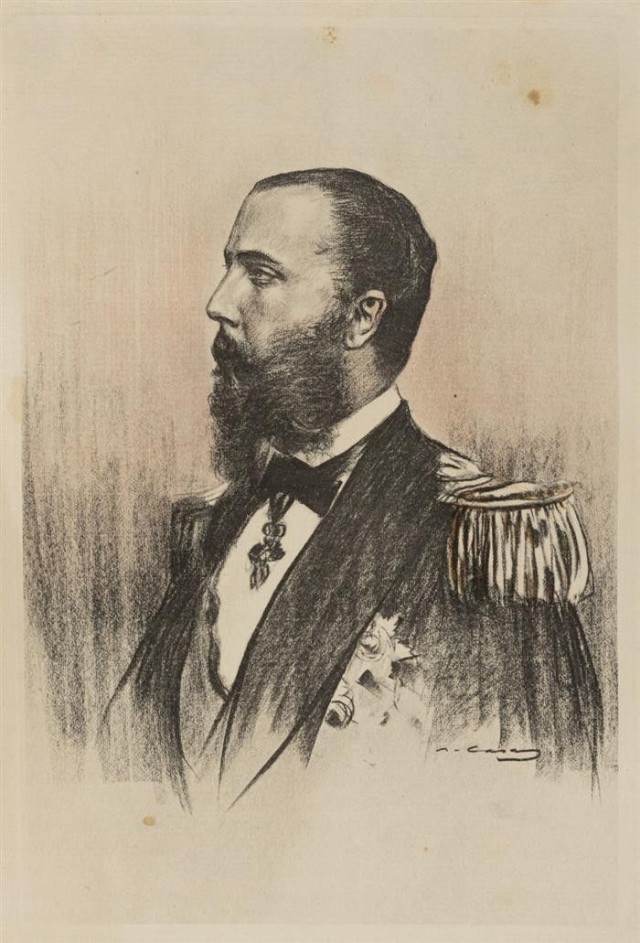
Emperor Maximilian I of Mexico

Empress Charlotte of Mexico

Emperor Maximilian I of Mexico

Emperor Franz Josef of Austria-Hungary

Queen Marie of Romania with her daughter, Princess Ileana and her son-in-law Archduke Anton of Austria

Emperor Maximilian of Mexico

Emperor Maximilian of Mexico

